ACC220 Law of Business Associations Written Hypothetical Assignment
VerifiedAdded on 2023/06/07
|9
|2795
|149
Homework Assignment
AI Summary
This document presents a comprehensive solution to a hypothetical assignment in ACC220 Law of Business Associations. The assignment addresses two key problems: the validity of a contract between Seedy Vineyards and Organic Wines Pty Ltd, examining issues of directorial authority and violations of the company's constitution; and the enforceability of an appointment clause and directorial duties regarding share transfers. The solution meticulously analyzes the legal issues, applying relevant sections of the Corporations Act 2001, including sections on directorial duties, indoor management rule, and the impact of object clauses, and supported by case law such as Salomon v Salomon & Co Ltd, Freeman & Lockyer v Buckhurst Park Properties (Magnal) Ltd, and Australian Metropolitan Life Assurance Co Ltd v Ure. The analysis delves into the roles and responsibilities of directors, the implications of breaching these duties, and the rights of shareholders. The assignment solution provides a detailed breakdown of the legal principles, their application to the facts, and the resulting conclusions, offering a valuable resource for students studying business law.
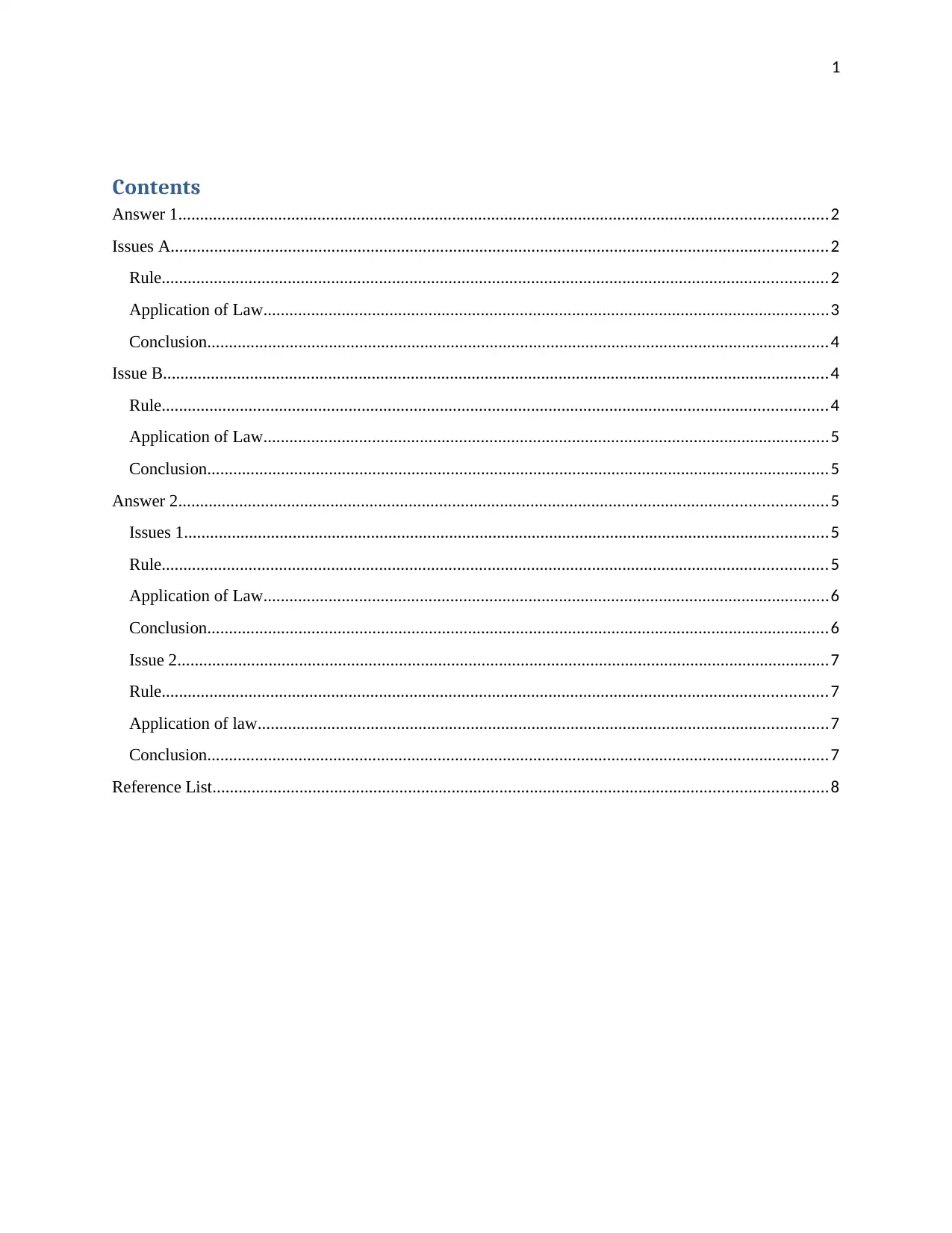
1
Contents
Answer 1.....................................................................................................................................................2
Issues A.......................................................................................................................................................2
Rule.........................................................................................................................................................2
Application of Law..................................................................................................................................3
Conclusion...............................................................................................................................................4
Issue B.........................................................................................................................................................4
Rule.........................................................................................................................................................4
Application of Law..................................................................................................................................5
Conclusion...............................................................................................................................................5
Answer 2.....................................................................................................................................................5
Issues 1....................................................................................................................................................5
Rule.........................................................................................................................................................5
Application of Law..................................................................................................................................6
Conclusion...............................................................................................................................................6
Issue 2......................................................................................................................................................7
Rule.........................................................................................................................................................7
Application of law...................................................................................................................................7
Conclusion...............................................................................................................................................7
Reference List.............................................................................................................................................8
Contents
Answer 1.....................................................................................................................................................2
Issues A.......................................................................................................................................................2
Rule.........................................................................................................................................................2
Application of Law..................................................................................................................................3
Conclusion...............................................................................................................................................4
Issue B.........................................................................................................................................................4
Rule.........................................................................................................................................................4
Application of Law..................................................................................................................................5
Conclusion...............................................................................................................................................5
Answer 2.....................................................................................................................................................5
Issues 1....................................................................................................................................................5
Rule.........................................................................................................................................................5
Application of Law..................................................................................................................................6
Conclusion...............................................................................................................................................6
Issue 2......................................................................................................................................................7
Rule.........................................................................................................................................................7
Application of law...................................................................................................................................7
Conclusion...............................................................................................................................................7
Reference List.............................................................................................................................................8
Paraphrase This Document
Need a fresh take? Get an instant paraphrase of this document with our AI Paraphraser
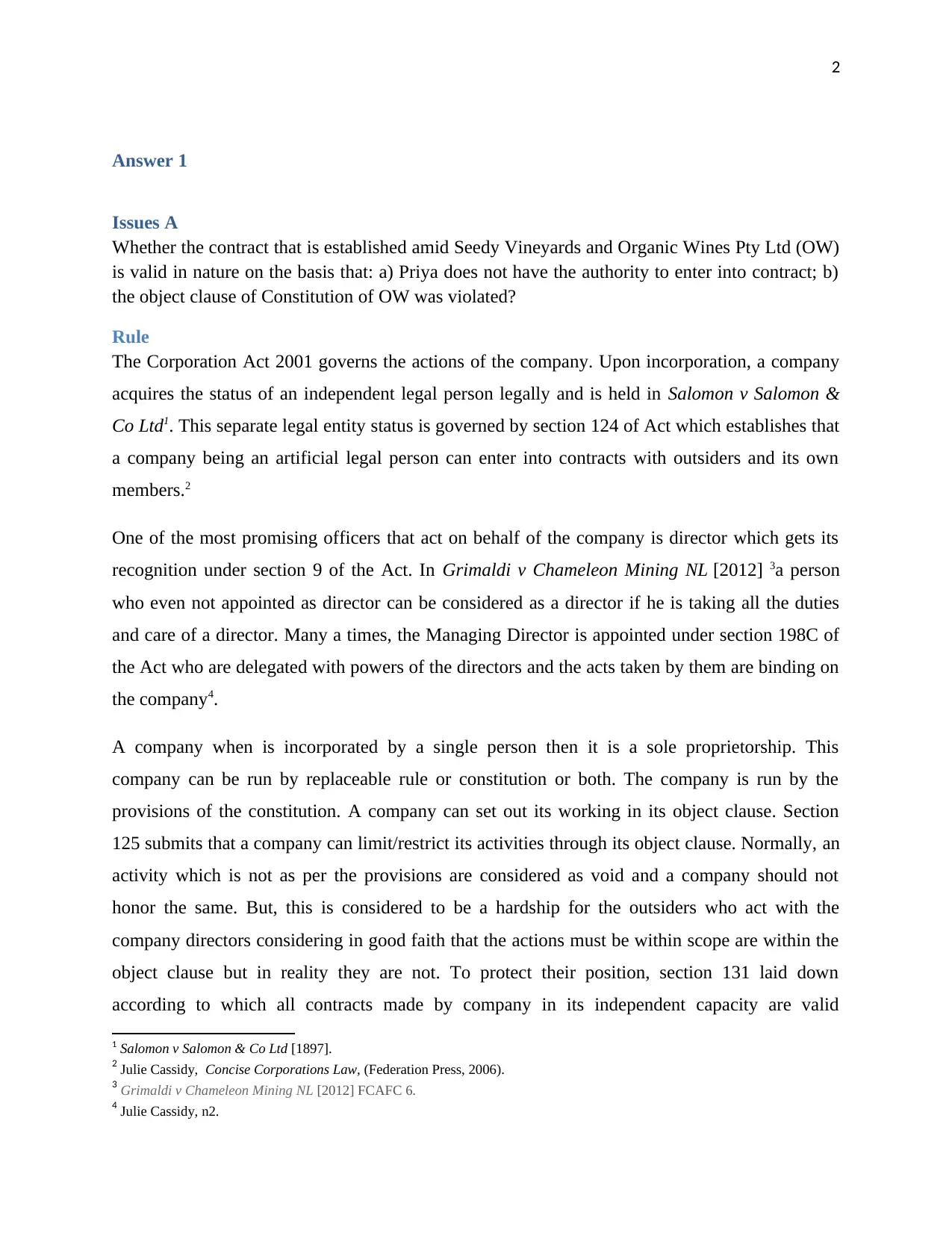
2
Answer 1
Issues A
Whether the contract that is established amid Seedy Vineyards and Organic Wines Pty Ltd (OW)
is valid in nature on the basis that: a) Priya does not have the authority to enter into contract; b)
the object clause of Constitution of OW was violated?
Rule
The Corporation Act 2001 governs the actions of the company. Upon incorporation, a company
acquires the status of an independent legal person legally and is held in Salomon v Salomon &
Co Ltd1. This separate legal entity status is governed by section 124 of Act which establishes that
a company being an artificial legal person can enter into contracts with outsiders and its own
members.2
One of the most promising officers that act on behalf of the company is director which gets its
recognition under section 9 of the Act. In Grimaldi v Chameleon Mining NL [2012] 3a person
who even not appointed as director can be considered as a director if he is taking all the duties
and care of a director. Many a times, the Managing Director is appointed under section 198C of
the Act who are delegated with powers of the directors and the acts taken by them are binding on
the company4.
A company when is incorporated by a single person then it is a sole proprietorship. This
company can be run by replaceable rule or constitution or both. The company is run by the
provisions of the constitution. A company can set out its working in its object clause. Section
125 submits that a company can limit/restrict its activities through its object clause. Normally, an
activity which is not as per the provisions are considered as void and a company should not
honor the same. But, this is considered to be a hardship for the outsiders who act with the
company directors considering in good faith that the actions must be within scope are within the
object clause but in reality they are not. To protect their position, section 131 laid down
according to which all contracts made by company in its independent capacity are valid
1 Salomon v Salomon & Co Ltd [1897].
2 Julie Cassidy, Concise Corporations Law, (Federation Press, 2006).
3 Grimaldi v Chameleon Mining NL [2012] FCAFC 6.
4 Julie Cassidy, n2.
Answer 1
Issues A
Whether the contract that is established amid Seedy Vineyards and Organic Wines Pty Ltd (OW)
is valid in nature on the basis that: a) Priya does not have the authority to enter into contract; b)
the object clause of Constitution of OW was violated?
Rule
The Corporation Act 2001 governs the actions of the company. Upon incorporation, a company
acquires the status of an independent legal person legally and is held in Salomon v Salomon &
Co Ltd1. This separate legal entity status is governed by section 124 of Act which establishes that
a company being an artificial legal person can enter into contracts with outsiders and its own
members.2
One of the most promising officers that act on behalf of the company is director which gets its
recognition under section 9 of the Act. In Grimaldi v Chameleon Mining NL [2012] 3a person
who even not appointed as director can be considered as a director if he is taking all the duties
and care of a director. Many a times, the Managing Director is appointed under section 198C of
the Act who are delegated with powers of the directors and the acts taken by them are binding on
the company4.
A company when is incorporated by a single person then it is a sole proprietorship. This
company can be run by replaceable rule or constitution or both. The company is run by the
provisions of the constitution. A company can set out its working in its object clause. Section
125 submits that a company can limit/restrict its activities through its object clause. Normally, an
activity which is not as per the provisions are considered as void and a company should not
honor the same. But, this is considered to be a hardship for the outsiders who act with the
company directors considering in good faith that the actions must be within scope are within the
object clause but in reality they are not. To protect their position, section 131 laid down
according to which all contracts made by company in its independent capacity are valid
1 Salomon v Salomon & Co Ltd [1897].
2 Julie Cassidy, Concise Corporations Law, (Federation Press, 2006).
3 Grimaldi v Chameleon Mining NL [2012] FCAFC 6.
4 Julie Cassidy, n2.
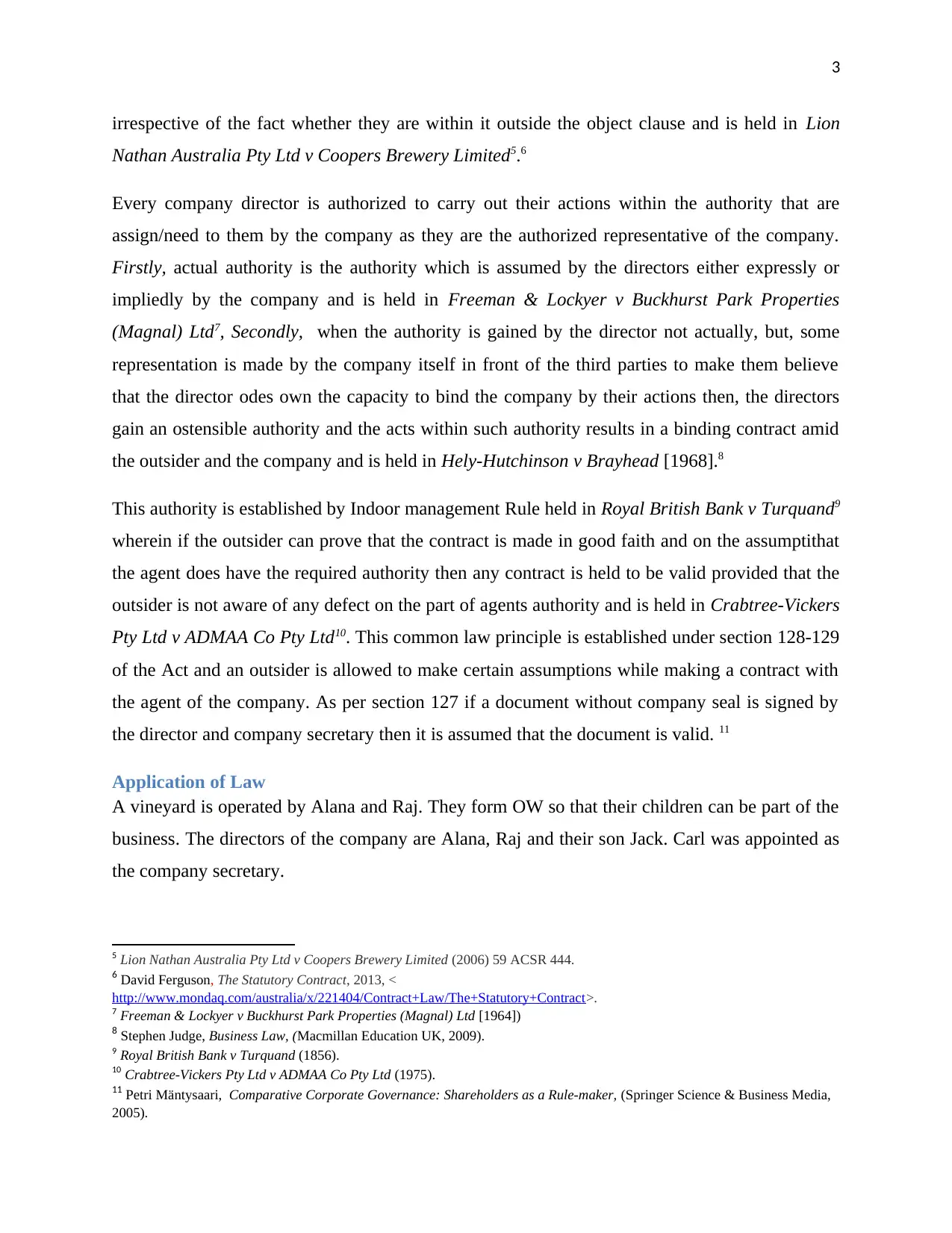
3
irrespective of the fact whether they are within it outside the object clause and is held in Lion
Nathan Australia Pty Ltd v Coopers Brewery Limited5.6
Every company director is authorized to carry out their actions within the authority that are
assign/need to them by the company as they are the authorized representative of the company.
Firstly, actual authority is the authority which is assumed by the directors either expressly or
impliedly by the company and is held in Freeman & Lockyer v Buckhurst Park Properties
(Magnal) Ltd7, Secondly, when the authority is gained by the director not actually, but, some
representation is made by the company itself in front of the third parties to make them believe
that the director odes own the capacity to bind the company by their actions then, the directors
gain an ostensible authority and the acts within such authority results in a binding contract amid
the outsider and the company and is held in Hely-Hutchinson v Brayhead [1968].8
This authority is established by Indoor management Rule held in Royal British Bank v Turquand9
wherein if the outsider can prove that the contract is made in good faith and on the assumptithat
the agent does have the required authority then any contract is held to be valid provided that the
outsider is not aware of any defect on the part of agents authority and is held in Crabtree-Vickers
Pty Ltd v ADMAA Co Pty Ltd10. This common law principle is established under section 128-129
of the Act and an outsider is allowed to make certain assumptions while making a contract with
the agent of the company. As per section 127 if a document without company seal is signed by
the director and company secretary then it is assumed that the document is valid. 11
Application of Law
A vineyard is operated by Alana and Raj. They form OW so that their children can be part of the
business. The directors of the company are Alana, Raj and their son Jack. Carl was appointed as
the company secretary.
5 Lion Nathan Australia Pty Ltd v Coopers Brewery Limited (2006) 59 ACSR 444.
6 David Ferguson, The Statutory Contract, 2013, <
http://www.mondaq.com/australia/x/221404/Contract+Law/The+Statutory+Contract>.
7 Freeman & Lockyer v Buckhurst Park Properties (Magnal) Ltd [1964])
8 Stephen Judge, Business Law, (Macmillan Education UK, 2009).
9 Royal British Bank v Turquand (1856).
10 Crabtree-Vickers Pty Ltd v ADMAA Co Pty Ltd (1975).
11 Petri Mäntysaari, Comparative Corporate Governance: Shareholders as a Rule-maker, (Springer Science & Business Media,
2005).
irrespective of the fact whether they are within it outside the object clause and is held in Lion
Nathan Australia Pty Ltd v Coopers Brewery Limited5.6
Every company director is authorized to carry out their actions within the authority that are
assign/need to them by the company as they are the authorized representative of the company.
Firstly, actual authority is the authority which is assumed by the directors either expressly or
impliedly by the company and is held in Freeman & Lockyer v Buckhurst Park Properties
(Magnal) Ltd7, Secondly, when the authority is gained by the director not actually, but, some
representation is made by the company itself in front of the third parties to make them believe
that the director odes own the capacity to bind the company by their actions then, the directors
gain an ostensible authority and the acts within such authority results in a binding contract amid
the outsider and the company and is held in Hely-Hutchinson v Brayhead [1968].8
This authority is established by Indoor management Rule held in Royal British Bank v Turquand9
wherein if the outsider can prove that the contract is made in good faith and on the assumptithat
the agent does have the required authority then any contract is held to be valid provided that the
outsider is not aware of any defect on the part of agents authority and is held in Crabtree-Vickers
Pty Ltd v ADMAA Co Pty Ltd10. This common law principle is established under section 128-129
of the Act and an outsider is allowed to make certain assumptions while making a contract with
the agent of the company. As per section 127 if a document without company seal is signed by
the director and company secretary then it is assumed that the document is valid. 11
Application of Law
A vineyard is operated by Alana and Raj. They form OW so that their children can be part of the
business. The directors of the company are Alana, Raj and their son Jack. Carl was appointed as
the company secretary.
5 Lion Nathan Australia Pty Ltd v Coopers Brewery Limited (2006) 59 ACSR 444.
6 David Ferguson, The Statutory Contract, 2013, <
http://www.mondaq.com/australia/x/221404/Contract+Law/The+Statutory+Contract>.
7 Freeman & Lockyer v Buckhurst Park Properties (Magnal) Ltd [1964])
8 Stephen Judge, Business Law, (Macmillan Education UK, 2009).
9 Royal British Bank v Turquand (1856).
10 Crabtree-Vickers Pty Ltd v ADMAA Co Pty Ltd (1975).
11 Petri Mäntysaari, Comparative Corporate Governance: Shareholders as a Rule-maker, (Springer Science & Business Media,
2005).
⊘ This is a preview!⊘
Do you want full access?
Subscribe today to unlock all pages.

Trusted by 1+ million students worldwide
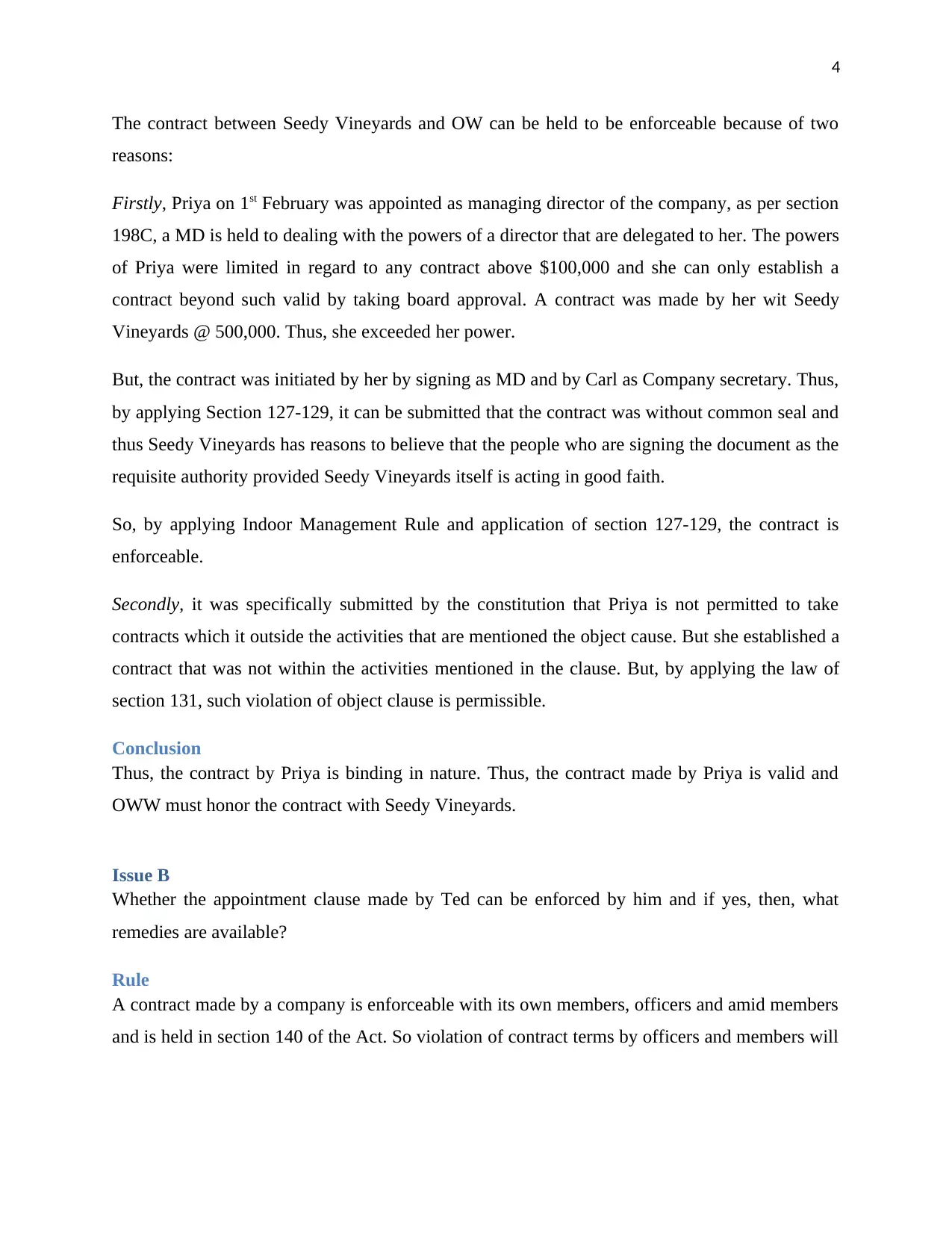
4
The contract between Seedy Vineyards and OW can be held to be enforceable because of two
reasons:
Firstly, Priya on 1st February was appointed as managing director of the company, as per section
198C, a MD is held to dealing with the powers of a director that are delegated to her. The powers
of Priya were limited in regard to any contract above $100,000 and she can only establish a
contract beyond such valid by taking board approval. A contract was made by her wit Seedy
Vineyards @ 500,000. Thus, she exceeded her power.
But, the contract was initiated by her by signing as MD and by Carl as Company secretary. Thus,
by applying Section 127-129, it can be submitted that the contract was without common seal and
thus Seedy Vineyards has reasons to believe that the people who are signing the document as the
requisite authority provided Seedy Vineyards itself is acting in good faith.
So, by applying Indoor Management Rule and application of section 127-129, the contract is
enforceable.
Secondly, it was specifically submitted by the constitution that Priya is not permitted to take
contracts which it outside the activities that are mentioned the object cause. But she established a
contract that was not within the activities mentioned in the clause. But, by applying the law of
section 131, such violation of object clause is permissible.
Conclusion
Thus, the contract by Priya is binding in nature. Thus, the contract made by Priya is valid and
OWW must honor the contract with Seedy Vineyards.
Issue B
Whether the appointment clause made by Ted can be enforced by him and if yes, then, what
remedies are available?
Rule
A contract made by a company is enforceable with its own members, officers and amid members
and is held in section 140 of the Act. So violation of contract terms by officers and members will
The contract between Seedy Vineyards and OW can be held to be enforceable because of two
reasons:
Firstly, Priya on 1st February was appointed as managing director of the company, as per section
198C, a MD is held to dealing with the powers of a director that are delegated to her. The powers
of Priya were limited in regard to any contract above $100,000 and she can only establish a
contract beyond such valid by taking board approval. A contract was made by her wit Seedy
Vineyards @ 500,000. Thus, she exceeded her power.
But, the contract was initiated by her by signing as MD and by Carl as Company secretary. Thus,
by applying Section 127-129, it can be submitted that the contract was without common seal and
thus Seedy Vineyards has reasons to believe that the people who are signing the document as the
requisite authority provided Seedy Vineyards itself is acting in good faith.
So, by applying Indoor Management Rule and application of section 127-129, the contract is
enforceable.
Secondly, it was specifically submitted by the constitution that Priya is not permitted to take
contracts which it outside the activities that are mentioned the object cause. But she established a
contract that was not within the activities mentioned in the clause. But, by applying the law of
section 131, such violation of object clause is permissible.
Conclusion
Thus, the contract by Priya is binding in nature. Thus, the contract made by Priya is valid and
OWW must honor the contract with Seedy Vineyards.
Issue B
Whether the appointment clause made by Ted can be enforced by him and if yes, then, what
remedies are available?
Rule
A contract made by a company is enforceable with its own members, officers and amid members
and is held in section 140 of the Act. So violation of contract terms by officers and members will
Paraphrase This Document
Need a fresh take? Get an instant paraphrase of this document with our AI Paraphraser
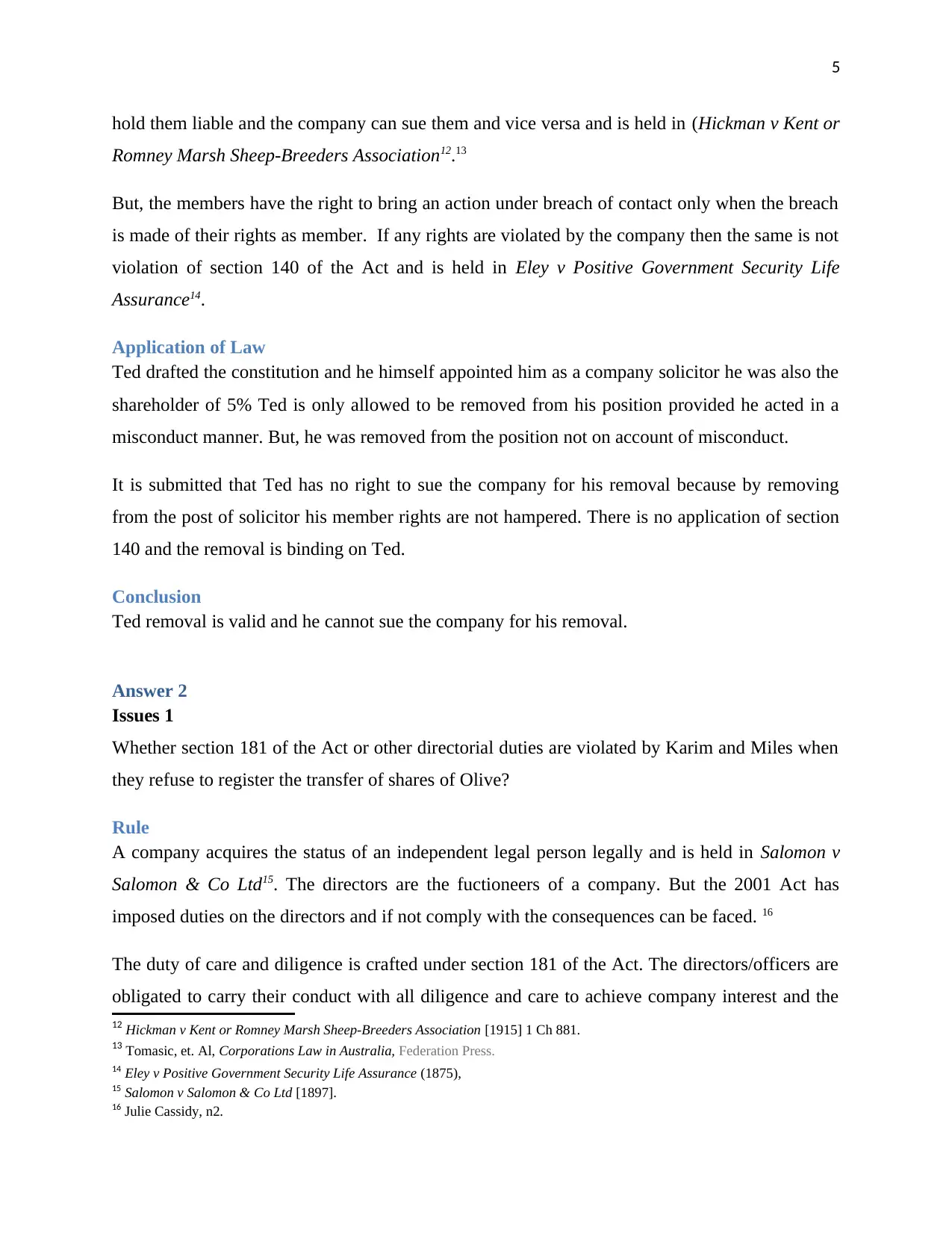
5
hold them liable and the company can sue them and vice versa and is held in (Hickman v Kent or
Romney Marsh Sheep-Breeders Association12.13
But, the members have the right to bring an action under breach of contact only when the breach
is made of their rights as member. If any rights are violated by the company then the same is not
violation of section 140 of the Act and is held in Eley v Positive Government Security Life
Assurance14.
Application of Law
Ted drafted the constitution and he himself appointed him as a company solicitor he was also the
shareholder of 5% Ted is only allowed to be removed from his position provided he acted in a
misconduct manner. But, he was removed from the position not on account of misconduct.
It is submitted that Ted has no right to sue the company for his removal because by removing
from the post of solicitor his member rights are not hampered. There is no application of section
140 and the removal is binding on Ted.
Conclusion
Ted removal is valid and he cannot sue the company for his removal.
Answer 2
Issues 1
Whether section 181 of the Act or other directorial duties are violated by Karim and Miles when
they refuse to register the transfer of shares of Olive?
Rule
A company acquires the status of an independent legal person legally and is held in Salomon v
Salomon & Co Ltd15. The directors are the fuctioneers of a company. But the 2001 Act has
imposed duties on the directors and if not comply with the consequences can be faced. 16
The duty of care and diligence is crafted under section 181 of the Act. The directors/officers are
obligated to carry their conduct with all diligence and care to achieve company interest and the
12 Hickman v Kent or Romney Marsh Sheep-Breeders Association [1915] 1 Ch 881.
13 Tomasic, et. Al, Corporations Law in Australia, Federation Press.
14 Eley v Positive Government Security Life Assurance (1875),
15 Salomon v Salomon & Co Ltd [1897].
16 Julie Cassidy, n2.
hold them liable and the company can sue them and vice versa and is held in (Hickman v Kent or
Romney Marsh Sheep-Breeders Association12.13
But, the members have the right to bring an action under breach of contact only when the breach
is made of their rights as member. If any rights are violated by the company then the same is not
violation of section 140 of the Act and is held in Eley v Positive Government Security Life
Assurance14.
Application of Law
Ted drafted the constitution and he himself appointed him as a company solicitor he was also the
shareholder of 5% Ted is only allowed to be removed from his position provided he acted in a
misconduct manner. But, he was removed from the position not on account of misconduct.
It is submitted that Ted has no right to sue the company for his removal because by removing
from the post of solicitor his member rights are not hampered. There is no application of section
140 and the removal is binding on Ted.
Conclusion
Ted removal is valid and he cannot sue the company for his removal.
Answer 2
Issues 1
Whether section 181 of the Act or other directorial duties are violated by Karim and Miles when
they refuse to register the transfer of shares of Olive?
Rule
A company acquires the status of an independent legal person legally and is held in Salomon v
Salomon & Co Ltd15. The directors are the fuctioneers of a company. But the 2001 Act has
imposed duties on the directors and if not comply with the consequences can be faced. 16
The duty of care and diligence is crafted under section 181 of the Act. The directors/officers are
obligated to carry their conduct with all diligence and care to achieve company interest and the
12 Hickman v Kent or Romney Marsh Sheep-Breeders Association [1915] 1 Ch 881.
13 Tomasic, et. Al, Corporations Law in Australia, Federation Press.
14 Eley v Positive Government Security Life Assurance (1875),
15 Salomon v Salomon & Co Ltd [1897].
16 Julie Cassidy, n2.
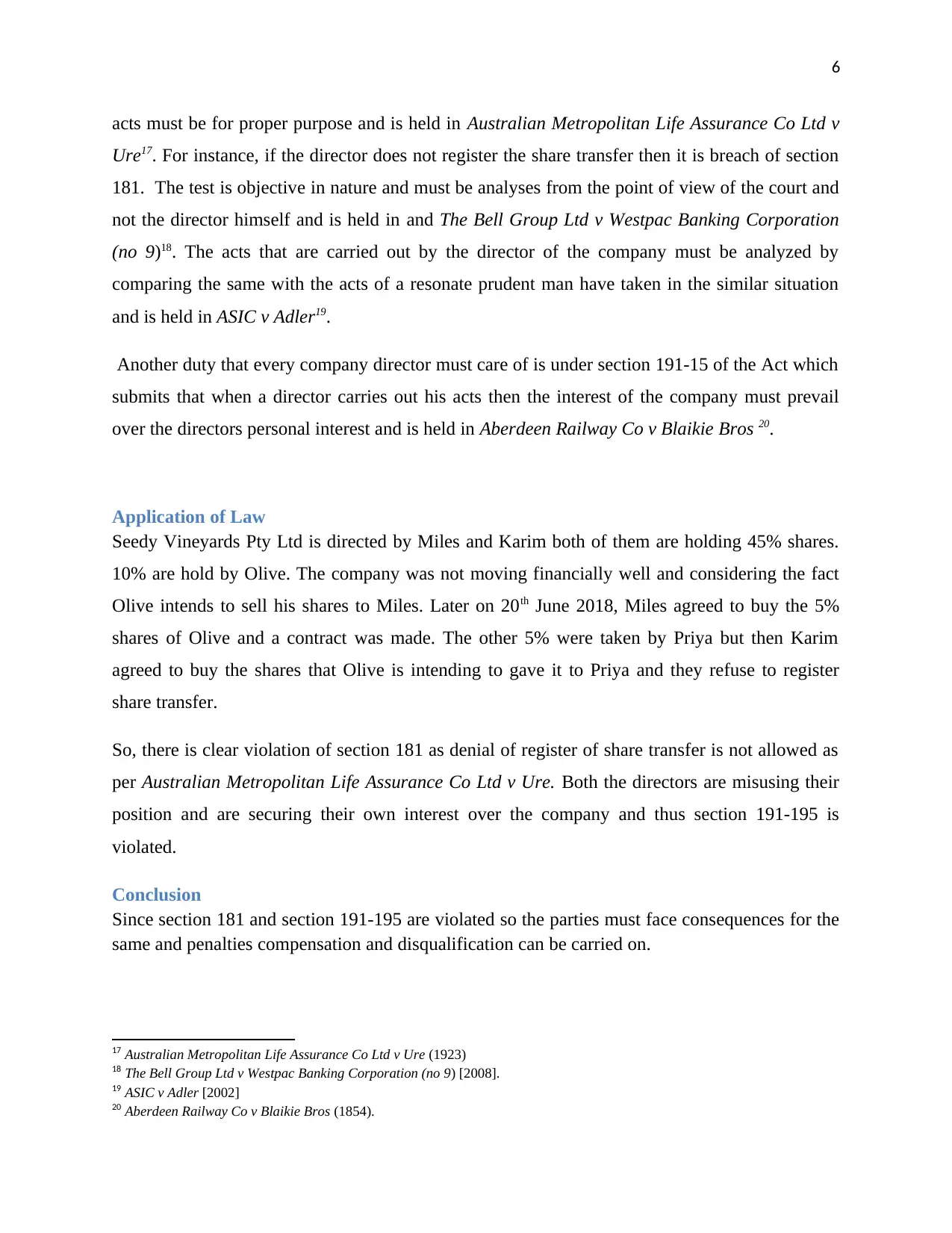
6
acts must be for proper purpose and is held in Australian Metropolitan Life Assurance Co Ltd v
Ure17. For instance, if the director does not register the share transfer then it is breach of section
181. The test is objective in nature and must be analyses from the point of view of the court and
not the director himself and is held in and The Bell Group Ltd v Westpac Banking Corporation
(no 9)18. The acts that are carried out by the director of the company must be analyzed by
comparing the same with the acts of a resonate prudent man have taken in the similar situation
and is held in ASIC v Adler19.
Another duty that every company director must care of is under section 191-15 of the Act which
submits that when a director carries out his acts then the interest of the company must prevail
over the directors personal interest and is held in Aberdeen Railway Co v Blaikie Bros 20.
Application of Law
Seedy Vineyards Pty Ltd is directed by Miles and Karim both of them are holding 45% shares.
10% are hold by Olive. The company was not moving financially well and considering the fact
Olive intends to sell his shares to Miles. Later on 20th June 2018, Miles agreed to buy the 5%
shares of Olive and a contract was made. The other 5% were taken by Priya but then Karim
agreed to buy the shares that Olive is intending to gave it to Priya and they refuse to register
share transfer.
So, there is clear violation of section 181 as denial of register of share transfer is not allowed as
per Australian Metropolitan Life Assurance Co Ltd v Ure. Both the directors are misusing their
position and are securing their own interest over the company and thus section 191-195 is
violated.
Conclusion
Since section 181 and section 191-195 are violated so the parties must face consequences for the
same and penalties compensation and disqualification can be carried on.
17 Australian Metropolitan Life Assurance Co Ltd v Ure (1923)
18 The Bell Group Ltd v Westpac Banking Corporation (no 9) [2008].
19 ASIC v Adler [2002]
20 Aberdeen Railway Co v Blaikie Bros (1854).
acts must be for proper purpose and is held in Australian Metropolitan Life Assurance Co Ltd v
Ure17. For instance, if the director does not register the share transfer then it is breach of section
181. The test is objective in nature and must be analyses from the point of view of the court and
not the director himself and is held in and The Bell Group Ltd v Westpac Banking Corporation
(no 9)18. The acts that are carried out by the director of the company must be analyzed by
comparing the same with the acts of a resonate prudent man have taken in the similar situation
and is held in ASIC v Adler19.
Another duty that every company director must care of is under section 191-15 of the Act which
submits that when a director carries out his acts then the interest of the company must prevail
over the directors personal interest and is held in Aberdeen Railway Co v Blaikie Bros 20.
Application of Law
Seedy Vineyards Pty Ltd is directed by Miles and Karim both of them are holding 45% shares.
10% are hold by Olive. The company was not moving financially well and considering the fact
Olive intends to sell his shares to Miles. Later on 20th June 2018, Miles agreed to buy the 5%
shares of Olive and a contract was made. The other 5% were taken by Priya but then Karim
agreed to buy the shares that Olive is intending to gave it to Priya and they refuse to register
share transfer.
So, there is clear violation of section 181 as denial of register of share transfer is not allowed as
per Australian Metropolitan Life Assurance Co Ltd v Ure. Both the directors are misusing their
position and are securing their own interest over the company and thus section 191-195 is
violated.
Conclusion
Since section 181 and section 191-195 are violated so the parties must face consequences for the
same and penalties compensation and disqualification can be carried on.
17 Australian Metropolitan Life Assurance Co Ltd v Ure (1923)
18 The Bell Group Ltd v Westpac Banking Corporation (no 9) [2008].
19 ASIC v Adler [2002]
20 Aberdeen Railway Co v Blaikie Bros (1854).
⊘ This is a preview!⊘
Do you want full access?
Subscribe today to unlock all pages.

Trusted by 1+ million students worldwide
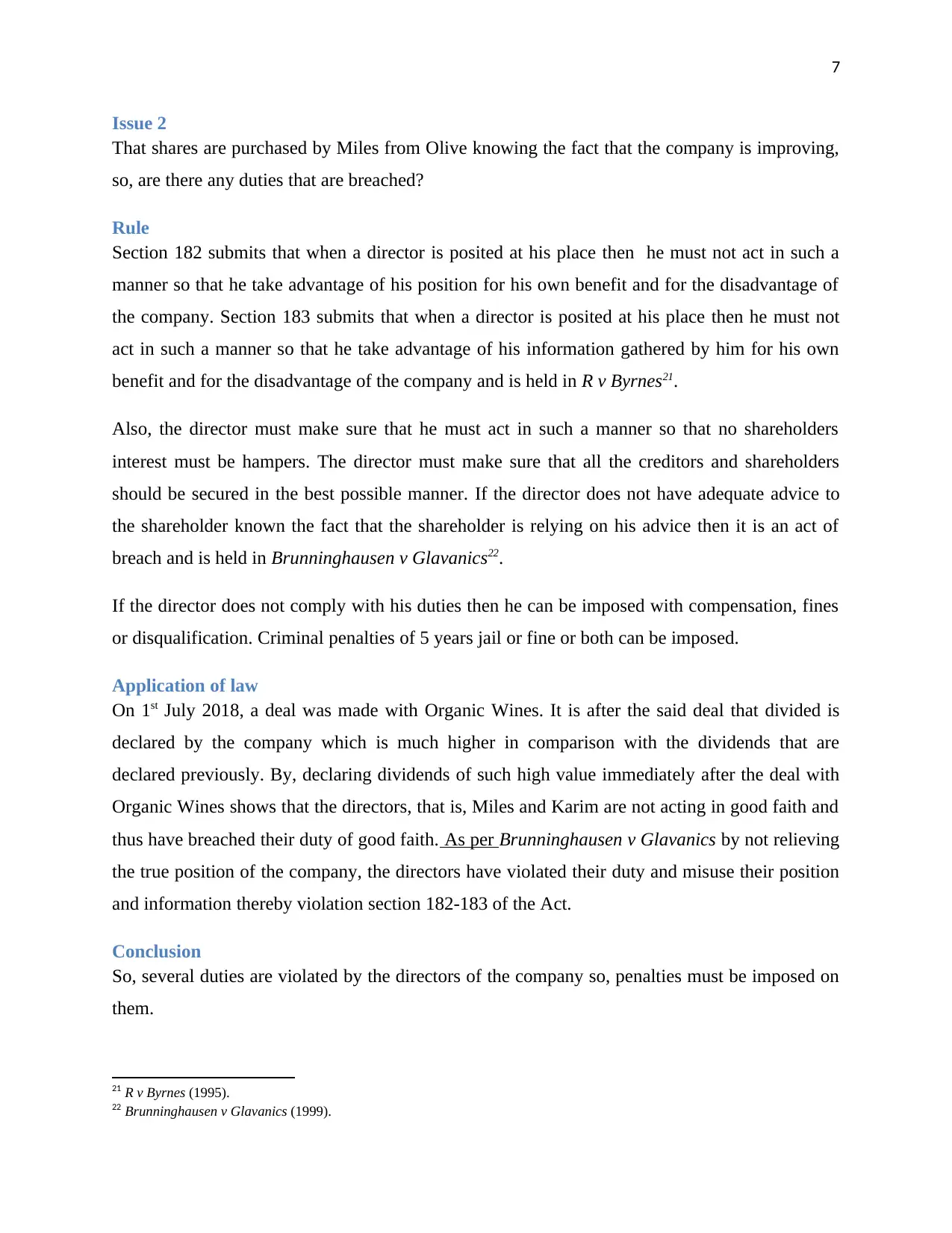
7
Issue 2
That shares are purchased by Miles from Olive knowing the fact that the company is improving,
so, are there any duties that are breached?
Rule
Section 182 submits that when a director is posited at his place then he must not act in such a
manner so that he take advantage of his position for his own benefit and for the disadvantage of
the company. Section 183 submits that when a director is posited at his place then he must not
act in such a manner so that he take advantage of his information gathered by him for his own
benefit and for the disadvantage of the company and is held in R v Byrnes21.
Also, the director must make sure that he must act in such a manner so that no shareholders
interest must be hampers. The director must make sure that all the creditors and shareholders
should be secured in the best possible manner. If the director does not have adequate advice to
the shareholder known the fact that the shareholder is relying on his advice then it is an act of
breach and is held in Brunninghausen v Glavanics22.
If the director does not comply with his duties then he can be imposed with compensation, fines
or disqualification. Criminal penalties of 5 years jail or fine or both can be imposed.
Application of law
On 1st July 2018, a deal was made with Organic Wines. It is after the said deal that divided is
declared by the company which is much higher in comparison with the dividends that are
declared previously. By, declaring dividends of such high value immediately after the deal with
Organic Wines shows that the directors, that is, Miles and Karim are not acting in good faith and
thus have breached their duty of good faith. As per Brunninghausen v Glavanics by not relieving
the true position of the company, the directors have violated their duty and misuse their position
and information thereby violation section 182-183 of the Act.
Conclusion
So, several duties are violated by the directors of the company so, penalties must be imposed on
them.
21 R v Byrnes (1995).
22 Brunninghausen v Glavanics (1999).
Issue 2
That shares are purchased by Miles from Olive knowing the fact that the company is improving,
so, are there any duties that are breached?
Rule
Section 182 submits that when a director is posited at his place then he must not act in such a
manner so that he take advantage of his position for his own benefit and for the disadvantage of
the company. Section 183 submits that when a director is posited at his place then he must not
act in such a manner so that he take advantage of his information gathered by him for his own
benefit and for the disadvantage of the company and is held in R v Byrnes21.
Also, the director must make sure that he must act in such a manner so that no shareholders
interest must be hampers. The director must make sure that all the creditors and shareholders
should be secured in the best possible manner. If the director does not have adequate advice to
the shareholder known the fact that the shareholder is relying on his advice then it is an act of
breach and is held in Brunninghausen v Glavanics22.
If the director does not comply with his duties then he can be imposed with compensation, fines
or disqualification. Criminal penalties of 5 years jail or fine or both can be imposed.
Application of law
On 1st July 2018, a deal was made with Organic Wines. It is after the said deal that divided is
declared by the company which is much higher in comparison with the dividends that are
declared previously. By, declaring dividends of such high value immediately after the deal with
Organic Wines shows that the directors, that is, Miles and Karim are not acting in good faith and
thus have breached their duty of good faith. As per Brunninghausen v Glavanics by not relieving
the true position of the company, the directors have violated their duty and misuse their position
and information thereby violation section 182-183 of the Act.
Conclusion
So, several duties are violated by the directors of the company so, penalties must be imposed on
them.
21 R v Byrnes (1995).
22 Brunninghausen v Glavanics (1999).
Paraphrase This Document
Need a fresh take? Get an instant paraphrase of this document with our AI Paraphraser
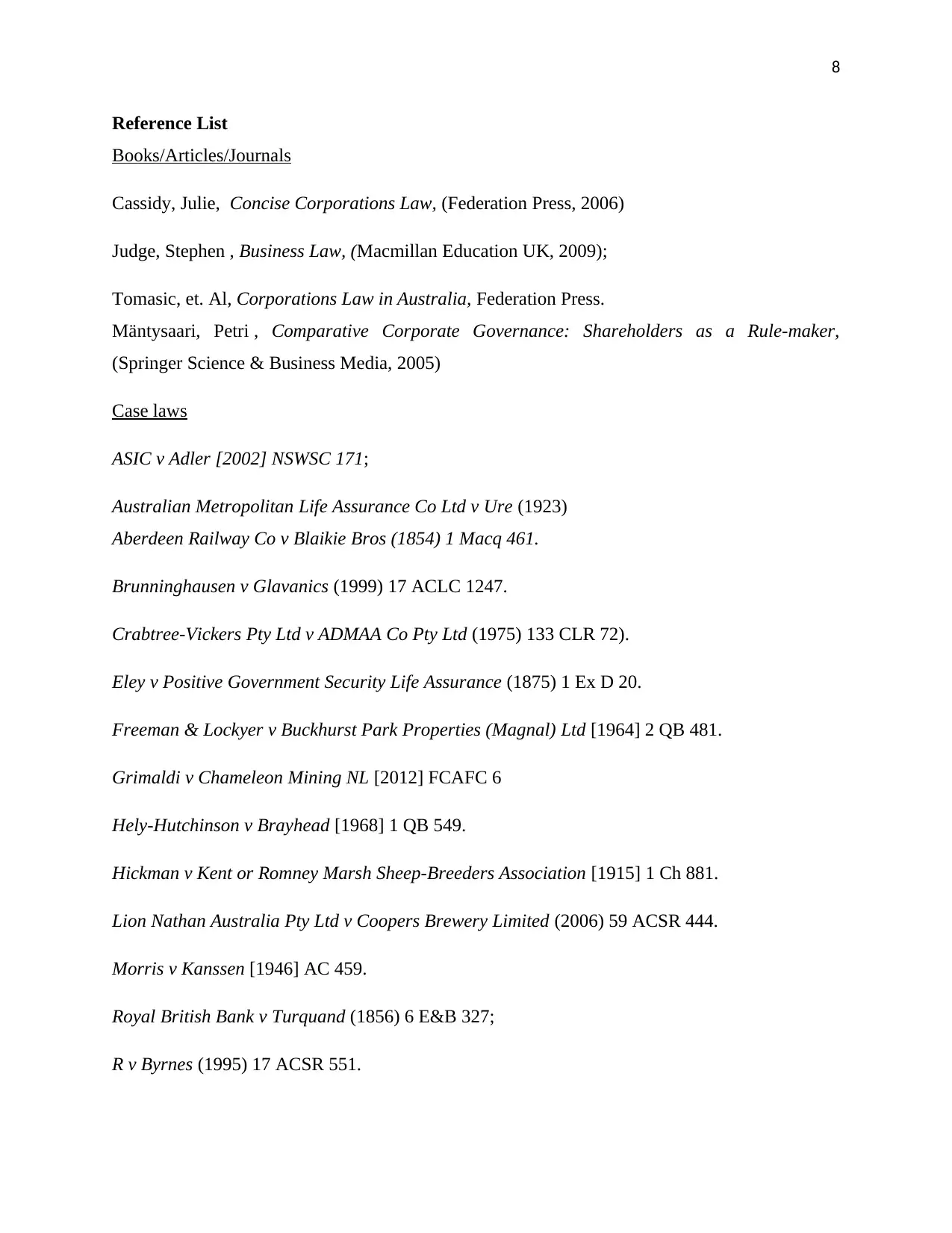
8
Reference List
Books/Articles/Journals
Cassidy, Julie, Concise Corporations Law, (Federation Press, 2006)
Judge, Stephen , Business Law, (Macmillan Education UK, 2009);
Tomasic, et. Al, Corporations Law in Australia, Federation Press.
Mäntysaari, Petri , Comparative Corporate Governance: Shareholders as a Rule-maker,
(Springer Science & Business Media, 2005)
Case laws
ASIC v Adler [2002] NSWSC 171;
Australian Metropolitan Life Assurance Co Ltd v Ure (1923)
Aberdeen Railway Co v Blaikie Bros (1854) 1 Macq 461.
Brunninghausen v Glavanics (1999) 17 ACLC 1247.
Crabtree-Vickers Pty Ltd v ADMAA Co Pty Ltd (1975) 133 CLR 72).
Eley v Positive Government Security Life Assurance (1875) 1 Ex D 20.
Freeman & Lockyer v Buckhurst Park Properties (Magnal) Ltd [1964] 2 QB 481.
Grimaldi v Chameleon Mining NL [2012] FCAFC 6
Hely-Hutchinson v Brayhead [1968] 1 QB 549.
Hickman v Kent or Romney Marsh Sheep-Breeders Association [1915] 1 Ch 881.
Lion Nathan Australia Pty Ltd v Coopers Brewery Limited (2006) 59 ACSR 444.
Morris v Kanssen [1946] AC 459.
Royal British Bank v Turquand (1856) 6 E&B 327;
R v Byrnes (1995) 17 ACSR 551.
Reference List
Books/Articles/Journals
Cassidy, Julie, Concise Corporations Law, (Federation Press, 2006)
Judge, Stephen , Business Law, (Macmillan Education UK, 2009);
Tomasic, et. Al, Corporations Law in Australia, Federation Press.
Mäntysaari, Petri , Comparative Corporate Governance: Shareholders as a Rule-maker,
(Springer Science & Business Media, 2005)
Case laws
ASIC v Adler [2002] NSWSC 171;
Australian Metropolitan Life Assurance Co Ltd v Ure (1923)
Aberdeen Railway Co v Blaikie Bros (1854) 1 Macq 461.
Brunninghausen v Glavanics (1999) 17 ACLC 1247.
Crabtree-Vickers Pty Ltd v ADMAA Co Pty Ltd (1975) 133 CLR 72).
Eley v Positive Government Security Life Assurance (1875) 1 Ex D 20.
Freeman & Lockyer v Buckhurst Park Properties (Magnal) Ltd [1964] 2 QB 481.
Grimaldi v Chameleon Mining NL [2012] FCAFC 6
Hely-Hutchinson v Brayhead [1968] 1 QB 549.
Hickman v Kent or Romney Marsh Sheep-Breeders Association [1915] 1 Ch 881.
Lion Nathan Australia Pty Ltd v Coopers Brewery Limited (2006) 59 ACSR 444.
Morris v Kanssen [1946] AC 459.
Royal British Bank v Turquand (1856) 6 E&B 327;
R v Byrnes (1995) 17 ACSR 551.
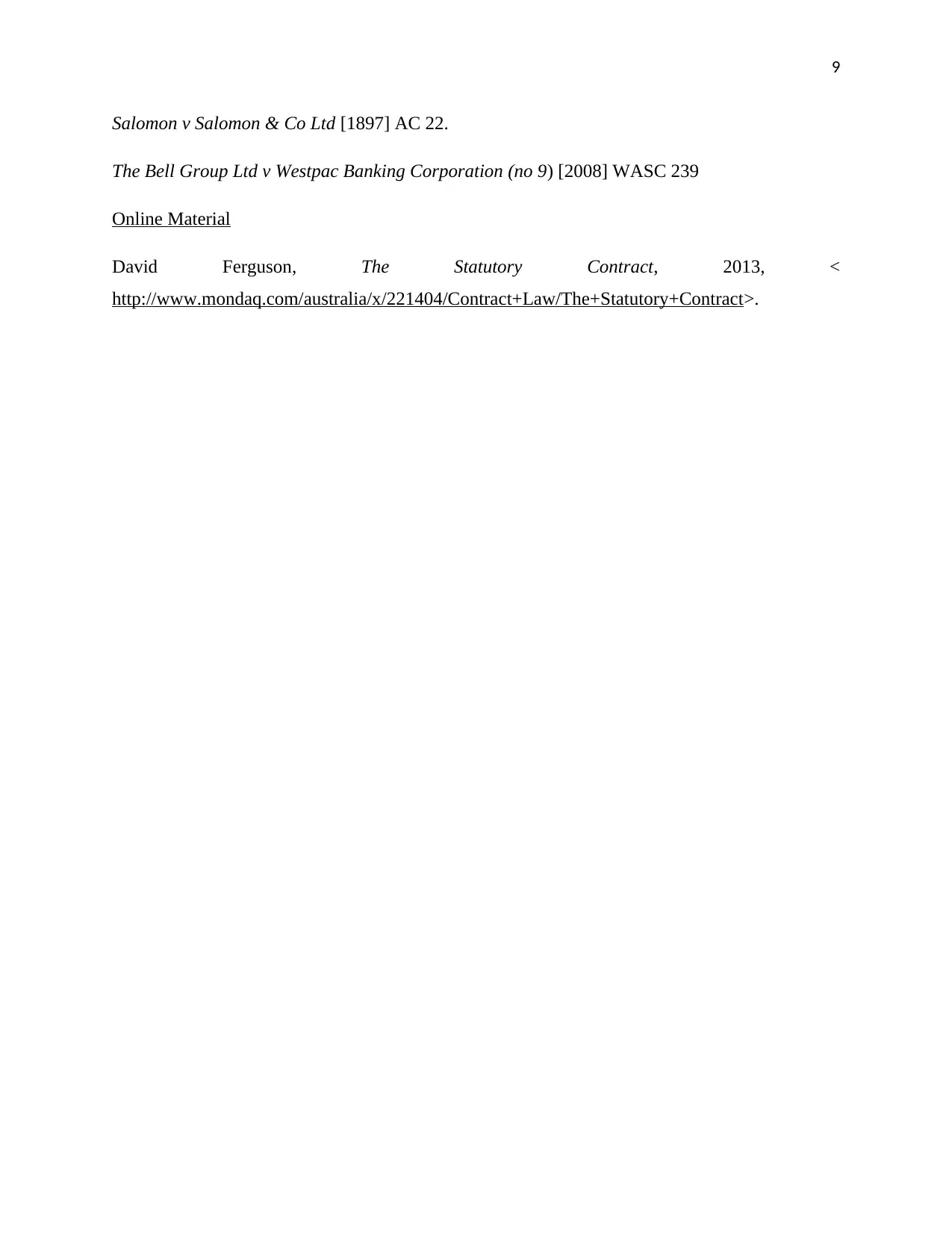
9
Salomon v Salomon & Co Ltd [1897] AC 22.
The Bell Group Ltd v Westpac Banking Corporation (no 9) [2008] WASC 239
Online Material
David Ferguson, The Statutory Contract, 2013, <
http://www.mondaq.com/australia/x/221404/Contract+Law/The+Statutory+Contract>.
Salomon v Salomon & Co Ltd [1897] AC 22.
The Bell Group Ltd v Westpac Banking Corporation (no 9) [2008] WASC 239
Online Material
David Ferguson, The Statutory Contract, 2013, <
http://www.mondaq.com/australia/x/221404/Contract+Law/The+Statutory+Contract>.
⊘ This is a preview!⊘
Do you want full access?
Subscribe today to unlock all pages.

Trusted by 1+ million students worldwide
1 out of 9
Related Documents
Your All-in-One AI-Powered Toolkit for Academic Success.
+13062052269
info@desklib.com
Available 24*7 on WhatsApp / Email
![[object Object]](/_next/static/media/star-bottom.7253800d.svg)
Unlock your academic potential
Copyright © 2020–2025 A2Z Services. All Rights Reserved. Developed and managed by ZUCOL.





